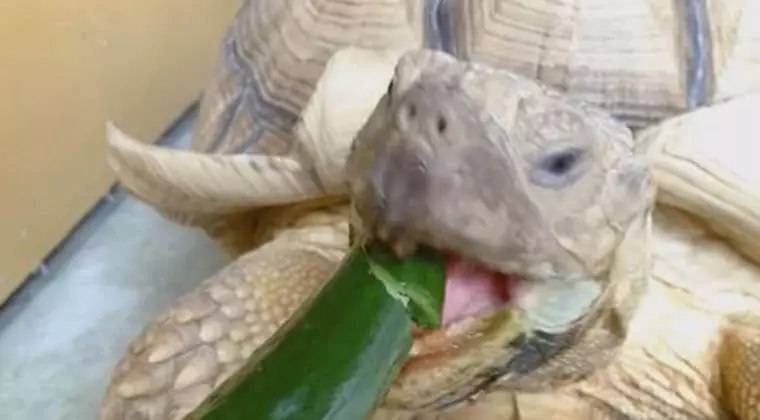Yes, Sulcata Tortoises can eat cucumbers. Cucumbers are a great source of hydration for these tortoises as well as fiber and vitamins. They should be chopped into small pieces to make it easier for the tortoise to digest them.
The seeds should also be removed before feeding the cucumber to your pet. Cucumbers can also provide variety in their diet and help keep them healthy by providing essential vitamins, minerals, and other nutrients they need. When adding cucumber to their diet, ensure that no more than 10 percent of their total intake is made up of fruits or vegetables such as cucumbers. Feeding them too much fruit could lead to health issues like obesity or diabetes so moderation is key!
Sulcata tortoises can enjoy cucumbers as part of their diet! Cucumbers are a great source of hydration, vitamins, minerals, and fiber. They should only be fed in moderation, as they contain high amounts of water which can lead to diarrhea if too much is consumed. Be sure to cut the cucumber into thin slices so that your tortoise won’t have difficulty swallowing it. Feeding them small amounts regularly will keep them healthy and happy!
Can Tortoise Eat Cucumber Skin?
Tortoises can safely eat cucumber skin. It is a great source of dietary fiber, vitamins A and C, as well as other essential nutrients. In addition to the nutritional benefits, cucumber skin also provides roughage which helps keep tortoise digestive tracts healthy.
When feeding your tortoise cucumber with skins on, make sure to cut it into small pieces so they are easier for them to digest.
Can Tortoises Eat Cucumber Seeds?
Tortoises can safely eat cucumber seeds, however, they should do so sparingly. Cucumbers are not a natural food for tortoises and their high water content can cause bloating and diarrhea if consumed in large quantities.
Additionally, cucumber seeds contain oxalic acid which can lead to bladder stones if eaten regularly. Therefore it is best to only give your tortoise a few cucumber seeds occasionally as a treat.
What Can Tortoises Eat List?
Tortoises are herbivores and have a varied diet that should include dark leafy greens, vegetables like squash, carrots, and bell peppers as well as fruits like apples and melon. Other good sources of nutrition for tortoises include hay or grasses (which provide fiber) and some commercial tortoise diets.
To ensure your pet gets enough calcium they should also be fed occasional treats of cuttlebone or mineral blocks specifically designed for reptiles.
Can Turtles Eat Cucumber Skin?
Yes, turtles can eat cucumber skin! Turtles are omnivores, meaning they eat both plants and animals. Cucumbers are a great source of vitamins A, B6, C, and E as well as fiber, magnesium, and antioxidants.
The skin of the cucumber is also beneficial to turtles since it contains many essential nutrients that their bodies need. In addition to being nutritious for them, cucumber skins provide an extra layer of texture in their diet which helps keep their jaws strong and healthy. When feeding your turtle cucumber skins make sure you cut them into small pieces so they don’t choke on them or have trouble digesting them.
Additionally, ensure that the skin has been thoroughly washed before feeding it to your pet turtle as any leftover dirt could cause health issues for your pet if ingested. Overall providing a variety of fruits and vegetables including the skin from cucumbers is a great way to supplement your turtles’ diets with additional nutritional benefits!
What Sulcata Tortoises Should Not Eat?
Sulcata tortoises (also known as African Spurred Tortoises) are native to the Sahara Desert and thrive in warm, dry climates. As such, they require a special diet that is high in fiber and low in protein. Unfortunately, many pet owners make the mistake of feeding the sulcata tortoise foods that they should not eat.
It is important for owners to understand what these animals should not be eating if they want them to stay healthy. One common misconception about sulcata tortoises is that they can eat any type of vegetation or leafy greens; however, this is untrue. While some fruits like berries and melon may provide a tasty treat once in a while, most vegetables should be avoided due to their potential toxicity when ingested by these creatures.
Additionally, sugary treats including candy and processed foods should also be completely avoided as they can cause an upset stomach for your pet or even lead to severe health problems down the line. It’s also important for owners to avoid giving their pets animal proteins like dog food or cat food which can contain too much fat content for these reptiles who need more fiber than protein in their diets.
What is a Sulcata Tortoise Favorite Food?
Sulcata tortoises, also called African spurred tortoises, are native to the African savanna and desert. They are herbivores that love to munch on grasses, weeds, flowers, and other vegetation. When kept as pets they should be offered a wide variety of fresh vegetables such as collard greens, kale, turnip tops, dandelion leaves, and endive.
Their diet can also include fruits like strawberries or bananas. It is important to provide them with a balanced diet by supplementing their plant-based food with some commercial foods specifically designed for their species such as Mazuri Tortoise Diet or Zoo Med Natural Grassland Tortoise Food.
Feeding my tortoise a cucumber
Conclusion
While cucumbers are not a traditional part of the diet for sulcata tortoises, they can be given as occasional treats. Cucumbers should always be served in moderation and only after being cut into small pieces to minimize choking hazards.
It is also important to provide other sources of nutrition such as vegetables and grasses so that the reptile’s diet remains balanced. Following these guidelines will help ensure that your pet enjoys all the benefits of eating cucumbers without any negative side effects.
